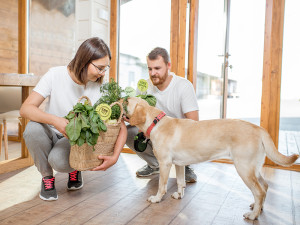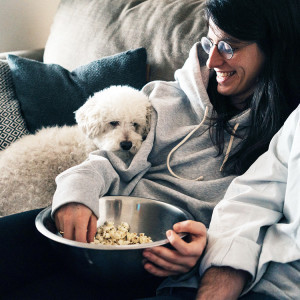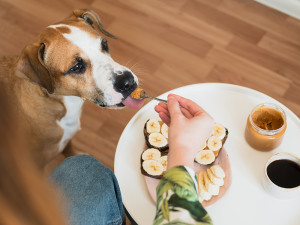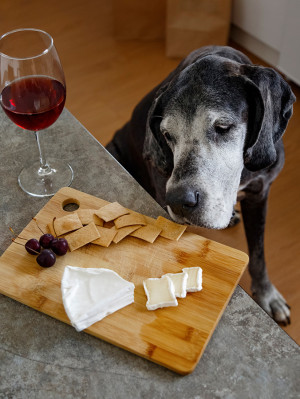Can Dogs Eat Olives?
They want in on your appetizers, too!

Share Article
In This Article:
Can Dogs Eat Olives? Are Olives Safe for Dogs? Can Olives Be Bad for Dogs? What To Do If Your Dog Eats an Olive? What to Feed Your Dog Instead of Olives
Many people like olives. They are found in various dishes, from pizza to salads to snacks. Like most foods, you may wonder if you can share olives with your dog. There are many meals that you can’t give to your dog because they have toxic ingredients. \
Are olives toxic to dogs? The answer is a bit ambiguous. They are not toxic, but they can be dangerous if not properly prepared. This article will examine the benefits and risks of olives for dogs and suggest healthier alternatives.
Can dogs eat olives?
Theoretically, dogs can eat olives, but some important considerations must be remembered. Plain, unsalted olives in small amounts are usually safe for dogs; however, how olives are prepared must be considered for potential health risks. Let’s look more carefully at olives and their safety for consumption by dogs.

Are olives safe for dogs?
Again, plain, unsalted olives are generally safe for dogs to consume in small amounts. There are some nutritional benefits. Antioxidants, healthy fats, and vitamins are contained in olives. However, like most of our table food, pet parents should only offer olives as an occasional treat.
Can olives be bad for dogs?
Despite their potential health benefits, there can be risks involved in offering your dog olives. Here are some concerns to keep in mind:
High salt content: Store-bought olives can contain too much salt, harming dogs. Dehydration, high blood pressure, or even salt poisoning can be caused by excessive salt.
Pits: Olive pits can be a choking hazard. They can lead to blockages of the intestines. They can also damage a dog’s teeth.
Preservatives and additives: Some seasonings, such as vinegar, onion, and garlic, are toxic to dogs. Olives sold in stores may have been prepared with these seasonings.
Pitting an olive is simple, and there are a few effective methods depending on what tools you have available:
Method one: Using an olive pitter (easiest)
Put the olive in the pitter’s cradle.
You only have to squeeze the handle, and the pit will come out on the other side.
Method two: Using a chef’s knife
You’ll need a cutting board to put the olive on.
Lay the flat side of your chef’s knife over the olive.
Press firmly (don’t press hard) to gently crush the olive.
The pressure will loosen the pit, and you can use your fingers to remove it.
Method three: Using a chopstick or skewer
With the olive in one hand, push the chopstick or skewer through the stem end of the olive.
The pit should pop out from the other side.
Method four: Using your fingers
This will work for soft olives. Simply squeeze the olive between your fingers until the pit pops out.
For large batches, you can crush multiple olives at once under a cutting board or plate and then remove the pits by hand.
Black olives
There are different varieties and preparations of olives. Some are safer than others or have more benefits. For example, black olives are lower iin sodium than green olives. You can safely feed black olives to your dog if given in small amounts and are plain and unsalted. They also need to be pitted to avoid a choking hazard.
Green olives
Green olives, on the other hand, tend to be saltier than black olives. They are usually harvested before they are ripe and cured in brine. The excess salt is not healthy for your dog. If you do give a few green olives, be sure they are plain, unsalted, and pitted.
Olive oil
Olive oil has several benefits for dogs and is often recommended as a supplement. It has healthy fats and anti-inflammatory properties and can help your dog’s skin, coat, and joints. However, too much oil oil can lead to obesity or digestive upset.
Stuffed olives
As you may suspect, stuffed olives are not safe for dogs, primarily due to what they are stuffed with. The ingredients often include:
Garlic and onion: Both are toxic to dogs and can cause anemia.
Cheese: Some dogs are lactose intolerant and may experience digestive issues.
Pimentos or peppers: These can be too spicy for dogs and may cause stomach upset.
What to do if your dog eats olives?
No need to panic if your dog eats a few plain, pitted olives. If a large amount is eaten, that’s a different story. Olives with pits or olives that contain additives are also cause for concern. Here’s what you should do:
Monitor closely for vomiting, diarrhea, increased thirst, or lethargy.
Determine the type of olives your dog ate.
Provide fresh water to counteract high sodium and prevent dehydration.
Contact your veterinarian. If your dog shows any concerning symptoms or has consumed a large number of olives, seek veterinary advice immediately.
If the olives had pits, monitor for choking or intestinal blockage.
What to feed your dog instead of olives
If you want to give your dog a healthy snack, there are plenty of safer alternatives to olives. Here are some nutritious treats you can offer instead:
Carrots: Low in calories and great for dental health.
Apple slices: A sweet, fiber-rich snack (remove the seeds and core).
Blueberries: Packed with antioxidants and vitamins.
Cucumber slices: Hydrating and low in calories.
Pumpkin: Great for digestion and full of nutrients.
Plain, cooked chicken or turkey: A protein-packed treat without added seasonings.
Plain yogurt: A probiotic-rich snack (ensure it’s free from artificial sweeteners like xylitol).
Bottom line
While olives are not toxic to dogs, how they are consumed or prepared can be problematic. They should only be given in small amounts occasionally without pits, salt, or seasonings. See our list above if you’re looking for a healthy snack for your pup. Better alternatives offer nutritional benefits without the risks associated with olives. Always consult your veterinarian before introducing new foods to your dog’s diet to ensure they remain happy and healthy.
References
Ballesta, M C, et al. “Adaptation of Biliary Response to Dietary Olive Oil and Sunflower-Seed Oil in Dogs.” opens in new tabBritish Journal of Nutrition, vol. 68, no. 1, July 1992, pp. 175–182,. Accessed 11 Mar. 2025.
Minieri, Sara, et al. “A Diet Supplemented with Oil-Free Olive Pulp Flour (MOP-ManniOlivePowder�®) Improves the Oxidative Status of Dogs.”opens in new tab Animals, vol. 14, no. 17, 4 Sept. 2024, p. 2568, Accessed 15 Jan. 2025.
Team, Enviroliteracy. “Are Dogs OK with Olives? - the Environmental Literacy Council.”opens in new tab The Environmental Literacy Council, 19 Feb. 2025, #google_vignette. Accessed 11 Mar. 2025.

Dr. Shelby Neely, DVM
Dr. Shelby Neely is a freelance writer and veterinarian who graduated from the University of Pennsylvania School of Veterinary Medicine and has practiced veterinary medicine for 30 years, specializing in small animals. Her work has appeared in Allivet, AsktheCatDoctor, WhiskerDocs, Ask the Cat Doctor Radio, Ask the Cat Doctor TV, and numerous other websites, brochures, newsletters, newspapers, and ebooks. In her spare time, Dr. Neely likes to spend time with her three children, two grandchildren, three cats, two grand-cats, and five grand-dogs.
Related articles
Can Dogs Eat Pretzels?
A salty treat, anyone?
![dog sitting by a bowl of popcorn]()
Can Dogs Eat Popcorn?
Your pup wants in on movie night.
![View over the shoulder of a women eating peanut butter and bananas and feeding some of the peanut butter to her dog on a spoon]()
Can Dogs Eat Peanut Butter?
Elvis famously loved peanut butter. So, can your “Hound dog” lap it up, too?
![Happy couple cooking dinner with dog watching.]()
Can Dogs Eat Garlic?
Like vampires, they should stay far away from garlic. Here’s why.
Can Dogs Eat Cheese?
We know they want to — but how much is safe?
Can Dogs Eat Garlic Bread?
It’s the king of sides, but definitely not for your dog. Read why.








